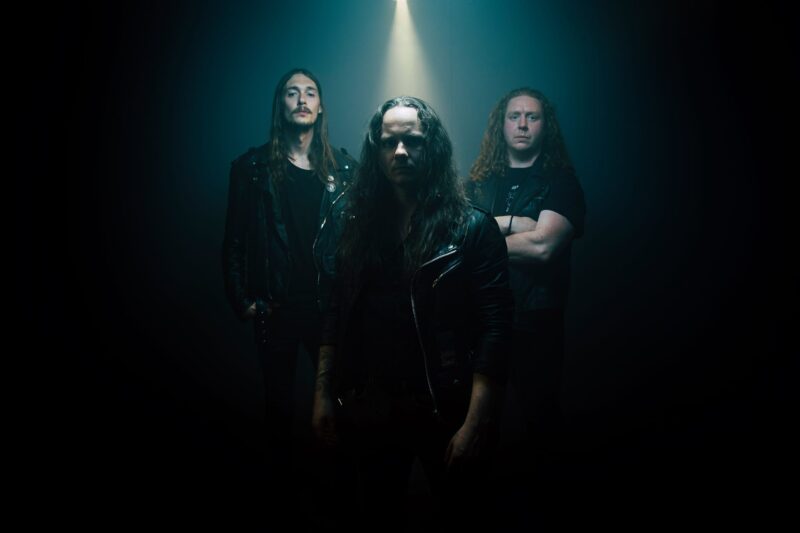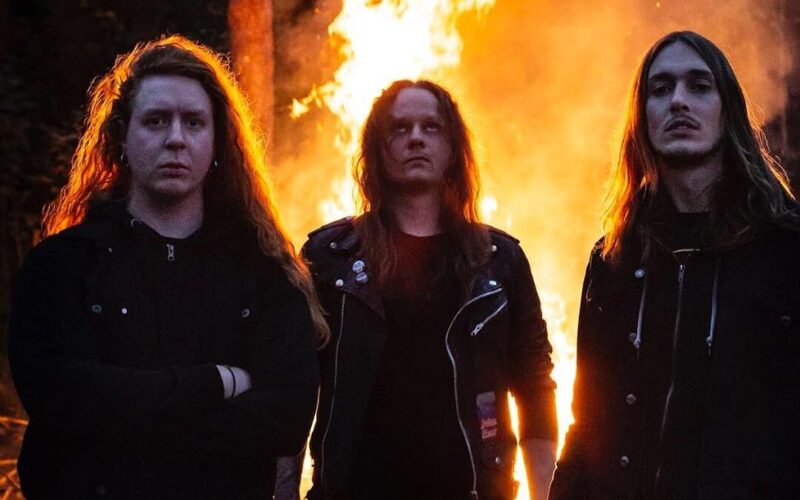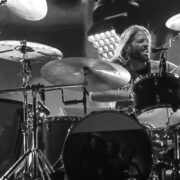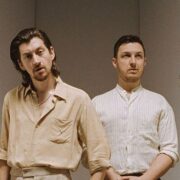A distanza di tre anni da “The Nekromant Lives”, i Nekromant pubblicano “Temple Of Haal”, album dal sapore mistico. Ne abbiamo parlato con il cantante del trio, Mattias Ottosson, che ci ha raccontato come miti e leggende scandinave abbiano influenzato la nascita di questo lavoro così evocativo.
-SCROLL DOWN FOR THE ENGLISH VERSION-
Ciao Mattias e benvenuto su SpazioRock. Come stai?
Ciao! Grazie. Tutto bene qui, sono seduto sul treno mattutino per Stoccolma nell’autunno svedese. Molto cupo.
Prima di tutto, perché avete cambiato il vostro moniker da Serpent a Nekromant nel 2016? C’erano delle ragioni particolari?
Ci sono state un paio di ragioni. Innanzitutto esistevano numerosi gruppi chiamati Serpent, che in un certo senso conoscevamo quando abbiamo iniziato. Era davvero solo una questione di tempo prima che fossimo costretti a cambiarlo. Non è mai bello dover modificare il nome della tua band dopo il primo album, ma doveva essere fatto.
“The Temple Of Haal” è il vostro nuovo album, il terzo dalla nascita dei Nekromant e il primo con Despotz Records. Vi sentite a un punto di svolta nella carriera?
Per come la vediamo noi, è il nostro quinto album. Non vedo alcuna differenza tra Serpent e Nekromant, a parte il nome. Sono gli stessi ragazzi che suonano lo stesso tipo di musica, non è cambiato nulla. Sento che ogni album è in qualche modo un punto di svolta, davvero. Non ci accontentiamo mai. Ciascun disco è in qualche modo diverso dal precedente e sebbene le basi siano le stesse, ci evolviamo ancora un po’ con ogni uscita. Questa volta, le tracce sono più lunghe ed epiche, quindi forse il prossimo sarà un platter pieno di pezzi di tre minuti, chissà!
Siete sempre stati un power trio. Avete mai pensato di includere un quarto musicista o pensate che la formazione a tre sia la migliore per la vostra musica ruvida e potente?
Non abbiamo mai pensato di avere un secondo chitarrista, ma immagino che quella porta non sia completamente chiusa. In futuro, qualora lo volessimo, potremmo anche aggiungere un chitarrista ritmico. Ma, per ora, è eccitante e creativo essere un trio. Se vuoi suonare heavy metal epico, ci sono delle sfide nell’essere in tre. La batteria e il basso devono lavorare di più per mantenere l’intensità durante gli assoli, e non esiste un modo ovvio per creare melodie epiche guidate dalla chitarra. Queste cose possono risultare frustranti, ma anche essere un innesco per la creatività poiché devi aggirare tali problemi.
Il titolo del disco ha qualcosa di esoterico. È un riferimento alle pratiche spirituali sufi o a qualche antica mitologia?
Haal è in realtà una parola molto antica per l’Halleberg, la montagna che si trova proprio alla periferia della nostra città natale, Vargön. La maggior parte di questo album è un tributo a questa montagna e all’area che la circonda. Questo posto è sempre stato intriso di leggenda e folklore locale, quindi mi è sembrato davvero appropriato inserirlo in ambito heavy metal, anche poiché tutti noi siamo nati lì. La magia di questo luogo non si riferisce a qualcosa di preciso di cui cerco di raccontare una storia nei testi, in genere cerco di creare delle sensazioni che si adattino alla canzone. Quindi, avevi ragione con il tuo accenno alla mitologia antica! Ben individuato!
Anche l’artwork è intriso di simbolismo oscuro. Cosa rappresenta?
La montagna (o montagne, dal momento che Halleberg ha il suo fratello maggiore, Hunneberg) è sempre stata conosciuta per l’alce gigante, quindi ovviamente la copertina dell’album doveva fare riferimento a questo in qualche modo. La struttura rituale che si vede nell’artwork è la mia interpretazione delle corna di alce, complete dell’antica runa norrena in alto a sinistra che simboleggia l’animale stesso.
 Photo credits: Robert Hellström
Photo credits: Robert Hellström
Entrando nella musica, possiamo dire che i Nekromant si collocano tra un hard rock tradizionale e una sorta di heavy doom influenzato da Black Sabbath e Pentagram. Sei d’accordo con questa definizione?
Sono d’accordo con questo, almeno è così che abbiamo iniziato. Tutti e tre siamo fondamentalmente cresciuti con lo stesso tipo di musica: Black Sabbath, Judas Priest, Rainbow e così via, quindi è naturale che siamo andati in quella direzione. Questo nuovo album è un po’ più tagliente, heavy metal nel senso più classico e meno cupo rispetto al passato, cosa di cui mi sento davvero entusiasta. Non pianifichiamo davvero queste cose in anticipo, l’evoluzione deve venire in qualche modo naturale ed essere significativa per noi in quel momento. Sono più a mio agio con il nostro sound ora di quanto non lo sia mai stato prima.
Ogni canzone è diversa dall’altra e questo sembra sicuramente un merito. C’è un lavoro maniacale nella composizione dei riff, come facevano le band degli anni ’60 e ’70: vi sentite un’eccezione nel mondo della musica usa e getta di oggi?
Non penso che siamo un’eccezione, ci sono un sacco di grandi band contemporanee là fuori. Tuttavia, ho un rapporto molto difficile con lo stato attuale del metal. Di recente ho ascoltato una playlist “New Metal” su Spotify e sono rimasto inorridito. La maggior parte delle cose che ho sentito non ha assolutamente nulla a che fare con il metal, o almeno, non ha quello che cerco nel metal. Non sto cercando di parlar male di nessuno (soprattutto perché la maggior parte di quelle band ha molto più successo di noi), ma, personalmente, sento che il genere è stato così diluito fino quasi a non essere riconosciuto. Ma poi i Grand Magus pubblicano un nuovo album e sono di nuovo un ragazzo felice. Non sono la persona giusta per giudicare se un certo tipo di musica è usa e getta o meno, ma per me è difficile negare che alla maggior parte del metal moderno manchi quasi tutto ciò che riguarda l’heavy metal propriamente detto.
“Olórin’s Song” è probabilmente la canzone più doom dell’album e sembra parlare di Olorin, uno dei nomi con cui era conosciuto Gandalf. L’immaginario de “Il Signore Degli Anelli” fa parte delle vostre ispirazioni?
Hai decisamente ragione. Generalmente non prendo ispirazione da Tolkien (anche se sono un fan da sempre), ma mi sembrava giusto per questo particolare pezzo. Sono molto contento di come è venuto fuori il brano, ma dubito che faremo mai più una canzone su un personaggio de “Il Signore Degli Anelli, è un po’ fuori dalla nostra strada. Ma questa volta sembrava giusto!
“Vaenir Dream” è un pezzo strumentale malinconico e sognante. Si riferisce alla mitologia norrena e ai Vaenir, un gruppo di divinità associate alla fertilità, alla saggezza e alla capacità di vedere il futuro? Come vedete il futuro del mondo e della società in generale?
Apprezzo il tuo riferimento, ma Vaenir è, in questo caso, una vecchia parola per il lago Vänern che si trova anche intorno a dove siamo cresciuti. È un enorme lago d’acqua dolce che emana sensazioni molto speciali per me. Tuttavia, proverò a rispondere alla domanda. Non posso parlare per gli altri ragazzi su questo argomento, ma la mia visione personale del futuro della società è piuttosto desolante. Immagino che potremmo fare un’inversione a U e rendere tutto fantastico, ma ne dubito. Sembra che le persone siano così affascinate dal progresso che accetteremo qualsiasi costo per questo. Personalmente non sono migliore: mi elettrizzo per la stessa stupida merda per cui si accendono tutti gli altri. Immagino che si riduca al fatto che siamo troppe persone sul pianeta, ma non saprei, non sono uno scienziato. Immagino che i Vaenir lo sappiano, ma chi può chiederglielo?
“Behind The Veils Of Eyes”, in alcuni momenti, ricorda l’epicità dei Candlemass, e pare un’esortazione a guardare oltre le apparenze e tornare a ciò che conta davvero. È questo anche il messaggio dell’album?
Grazie mille! L’album non ha messaggi. Non sto cercando di trasmettere un punto di vista o di influenzare qualcuno a pensare in un modo particolare. Con i testi, sto solo cercando di creare una sensazione che mi stimoli in un modo o nell’altro. Posso solo essere grato se gli altri possono sentirsi allo stesso modo, ma non sto cercando di persuadere nessuno. Si tratta davvero solo del godimento dell’heavy metal.
Avete in programma un tour nel 2022 per promuovere il nuovo album? Sarete anche in Italia?
Sicuramente! Abbiamo in programma un tour più breve in Germania a novembre 2022, speriamo di poter raggiungere anche l’Italia. Faremo del nostro meglio! Seguite la nostra pagina Facebook per maggiori dettagli.
Grazie per l’intervista. Vuoi lasciare un messaggio ai vostri fan italiani e ai nostri lettori?
Grazie mille! È stato un piacere rispondere a domande ponderate come le tue. Continuate a combattere e speriamo di vedervi on the road! Saluti!

-ENGLISH VERSION-
Hi Mattias and welcome to SpazioRock. How are you?
Hello! Thank you. All good here, sitting on the early morning train to Stockholm in Swedish autumn. Very bleak.
First of all, why did you change your moniker from Serpent to Nekromant in 2016? Were there any particular reasons?
A couple of reasons. For one, there is a number of bands called Serpent, which we kind of knew when we started out. It was really just a matter of time until we had to change it. It’s never good to have to change your band name after the first album, but it just had to be done.
“The Temple Of Haal” is your new album, it is the third one since Nekromant was born and the first one with Despotz Records. Do you feel like you are at a turning point in your career?
Well, the way we see it, it is our fifth album. I don’t see any difference between Serpent and Nekromant apart from the name. It’s the same guys playing the same kind of music, nothing really changed. I feel like every album is somewhat of a turning point, really. We don’t just settle for anything. Every album is somewhat different from the previous and although the foundations are the same, we still evolve a bit with each release. This time, the tracks are longer and more epic, so maybe the next will be full of 3-minute bangers, who knows!
You have always been a power trio. Have you ever thought about including a fourth musician or do you think the three-way line-up is the best one for your rough and powerful music?
We never really considered having a second guitarist, but I guess that door is not completely closed. If we feel like having a rhythm guy in the future, we will. But for now, it feels exciting and creative to be a three piece. If you want to play epic heavy metal, there are challenges with being a trio. The drums and bass have to work harder to keep up the intensity during solos, and there is no obvious way to create epic, guitar driven melodies. This stuff can be frustrating, but it can also be a trigger for creativity since you have to work around those issues.
The title of the record has something esoteric about it. Is it a reference to Sufi spiritual practices or some ancient mythology?
The word “Haal” is actually a very old word for the mountain “Halleberg”, which is located right on the outskirts of our hometown, Vargön. Most of this album is a tribute to this mountain and the area surrounding it. This place has always been steeped in legend and local folklore so it felt really fitting to put it into a heavy metal setting and since we all were born there, it felt appropriate. The magic of this place is not something that I’m trying to tell a story about in the lyrics, I generally try to create a feeling that suits the song. So, you were right with your connotation to ancient mythology! Well spotted!
Even the artwork is full of dark symbolism. What does it represent?
The mountain (or mountains, since Halleberg has its own bigger brother, Hunneberg) has always been known for giant moose, so of course the album cover had to reference that in some way. The ritualistic structure you see is my take on moose antlers, complete with the ancient Norse rune for moose on the top left side.

Going into the music, we can say that Nekromant is located between a traditional hard rock and a sort of heavy doom influenced by Black Sabbath and Pentagram. Do you agree with this definition?
I would agree with that, that is at least how we started out. All three of us is basically brought up on the same kind of music; Black Sabbath, Judas Priest, Rainbow and so on, so its only natural that we went in that direction. This new album is a little sharper, more classic heavy metal and less doomy than before, which I feel really excited about. We don’t really plan out these things beforehand, the evolution has to come somewhat naturally and feel meaningful to us at the time. I am more comfortable with our sound now than I have ever been before.
Each song is different from the other and this certainly appears to be a merit. There is a maniacal work in the composition of the riffs, as the bands of the 60s and 70s did: do you feel like you are an exception in the world of today’s disposable music?
I don’t think that we are an exception, there are a lot of great contemporary bands out there. However, I have a very hard time with the current state of metal. I recently listened through a “New Metal” playlist on Spotify, and I was horrified. Most of the stuff I heard there has absolutely nothing to do with metal in my book, or at least, it doesn’t have what I am looking for in metal. I’m not trying to shit on anyone (especially since most of those bands are way more successful than us), but personally, I feel that the genre has been thinned out to almost un-recognition. But then, Grand Magus releases a new album and I’m a happy boy again. I am not the right person to judge if some music is disposable or not, but for me, it’s hard to deny that most modern metal lacks almost everything that heavy metal is about.
“Olórin’s Song” is probably the most doom song on the album and it seems to talk about Olórin, one of the names Gandalf was known by. Is the imagery of “The Lord Of The Rings” part of your inspirations?
You are very right. No, I generally don’t take inspiration from Tolkien (even though I have been a fan since forever), but it felt right for this particular song. I am very happy with how that came out, but I doubt that we will ever do a song about a Lord of the rings character again, it is a little out of our wheelhouse. But it felt right this time!
“Vaenir Dream” is a melancholic and dreamy instrumental piece. Does it refers to Norse mythology and to the Vaenir, a group of gods associated with fertility, wisdom, and the ability to see the future? How does Nekromant see the future of the world and society in general?
I appreciate your reference, but the word “Vaenir” is in this instance an old word for lake Vänern which also is located around where we grew up. It is a huge freshwater lake that has a very special feeling for me. However, I’ll try to answer the question. I can’t speak for the other guys on this matter, but my personal outlook on the future of society is pretty bleak. I guess we could make a U-turn and make everything great, but I doubt it. It seems like people are so fascinated with progress that we will accept any cost for it. I personally am no better; I get excited by the same stupid shit everyone else does. I guess it boils down to that we are too many people on the planet, but what do I know, I am not a scientist. I guess the Vanir knows, but who can ask them?
“Behind The Veils Of Eyes”, in some moments, recalls the epicness of Candlemass, and it seems an exhortation to look beyond appearances and go back to what really matters. Is this the message of the album, too?
Thank you very much! The album has no message. I am not trying to convey a point of view or influence anyone to think in a particular way. With the lyrics, I am just trying to create a feeling that excites me in some way or another. I can only be thankful if others can feel the same way about it, but I am not trying to influence anyone. Its really just about the enjoyment of heavy metal.
Are you planning a tour for the next year in order to promote the new album? Do you think you will also show up in Italy? And which bands would you like to share the stage with in the future?
We sure do! We have a smaller tour over Germany planned in November 2022, hopefully we can make Italy happen as well. We will do our best! Please follow our Facebook page for more details as we go.
Thank you for the interview. Would you like to leave a message to your Italian fans and to our readers?
Thank you very much! It is a pleasure to answer thoughtful questions such as yours. Keep warrioring and we will hopefully see you on the road! Cheers!











